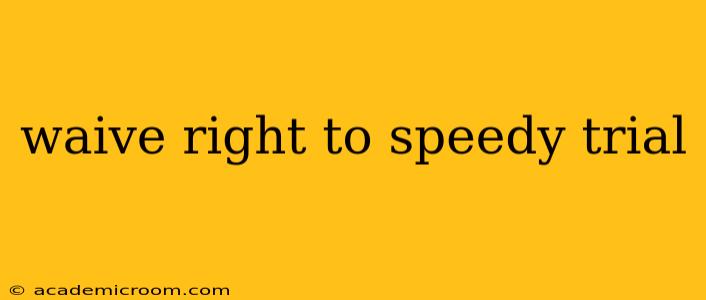The Sixth Amendment to the U.S. Constitution guarantees the right to a speedy trial. This crucial right protects individuals from prolonged pretrial detention and ensures that cases are resolved promptly. However, under certain circumstances, defendants may choose to waive this right. This decision, however, carries significant implications and should not be taken lightly. This article explores the reasons behind waiving a speedy trial, the potential consequences, and the process involved.
What is the Right to a Speedy Trial?
The right to a speedy trial isn't defined by a specific number of days. Courts consider several factors to determine if a defendant's right has been violated, including:
- Length of the delay: The longer the delay, the more likely it is a violation.
- Reason for the delay: Delays caused by the prosecution are more problematic than those caused by the defense.
- Defendant's assertion of the right: Did the defendant promptly object to the delay?
- Prejudice to the defendant: Has the delay harmed the defendant's ability to prepare a defense? This could include witness unavailability, loss of evidence, or impairment of memory.
Why Would Someone Waive Their Right to a Speedy Trial?
Several reasons might lead a defendant to waive their right to a speedy trial. These often involve strategic considerations in the defense:
-
Need for More Time to Prepare a Defense: Complex cases involving extensive discovery (the process of gathering evidence) may require more time for the defense to thoroughly investigate and prepare their case. This could involve interviewing witnesses, analyzing documents, or conducting expert investigations.
-
Negotiating a Plea Bargain: Waiving the speedy trial right often buys time for plea negotiations. The defense might seek a more favorable plea deal in exchange for delaying the trial. This strategy can sometimes lead to a reduced sentence or lesser charges.
-
Strategic Delay for the Defense: In some instances, a delay might benefit the defense strategically. For example, key witnesses might become unavailable to the prosecution over time, or evidence could deteriorate.
-
Mental Health Considerations: In some cases, the defendant might need more time to address mental health issues or receive treatment before going to trial.
-
Unforeseen Circumstances: Unexpected events, such as illness or the unavailability of a key witness for either side, can lead to a justifiable delay.
What are the Consequences of Waiving a Speedy Trial?
While waiving a speedy trial can be advantageous in some cases, it’s crucial to understand the potential downsides:
-
Increased Pre-Trial Detention: If the defendant is in custody, a waiver extends their time in jail awaiting trial. This can have significant emotional and psychological effects.
-
Weakening of the Defense: While a delay can sometimes strengthen a defense, it can also weaken it if key evidence or witnesses become unavailable or memories fade.
-
Public Perception: A lengthy delay might create a negative perception in the public eye, even if the delay is justified.
-
Diminished Chances of a Favorable Outcome: While a delay might allow for negotiations, it doesn't guarantee a better outcome. The case could still result in a conviction.
How Do You Waive Your Right to a Speedy Trial?
Waiving the right to a speedy trial is typically done formally through a written motion filed with the court. This motion requires the defendant's explicit consent and understanding of the consequences. The judge will review the motion and determine if the waiver is appropriate. It’s highly recommended to seek experienced legal counsel before waiving this right.
Can a Speedy Trial Right be Waived Implicitly?
While a formal, written waiver is preferred, a defendant might implicitly waive their right through their actions or inaction. For example, repeatedly agreeing to continuances (postponements) without objection could be interpreted as an implicit waiver. However, this is a complex area of law, and the specific circumstances of each case are crucial in determining whether an implicit waiver has occurred.
What Happens if the Right to a Speedy Trial is Violated?
If a court determines that a defendant's right to a speedy trial has been violated, the charges against them may be dismissed. The specific outcome depends on the facts of the case and the court's interpretation of the violation.
This information is for educational purposes only and should not be considered legal advice. Consulting with a qualified attorney is essential for any legal matter, especially those involving waiving constitutional rights.
